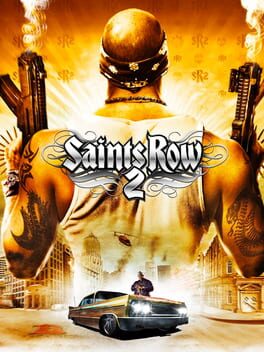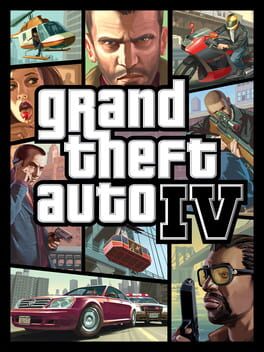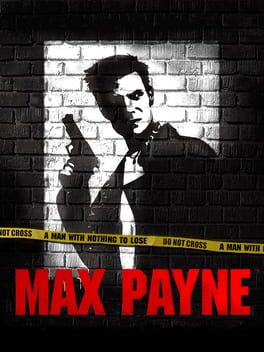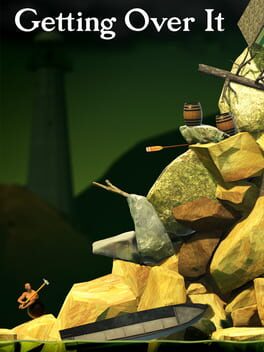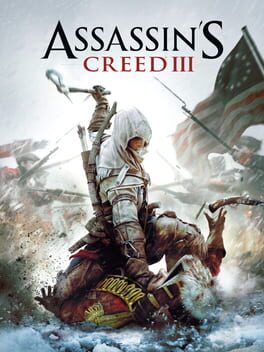marshkie
2008
2008
2001
This review contains spoilers
Max Payne’s greatest triumph is its premise: “a gritty neo-noir shooter featuring the directorial flourishes of John Woo”. Blood soaked hallways bathed in fluorescent light, empty shells searing prints into dirty snow - all it takes is a simple description of the core concept to generate a flurry of images in the consumer’s mind. It’s a pitch so vivid and tantalizing it actually ends up being detrimental - how could the game itself live up to your imagination? The greatest compliment I can give Max Payne is that from time to time it actually does.
One moment that sticks out in my mind is a descent down a switchback staircase halfway through the game. By this point I’ve learned to slow-motion dive into every new area, and my caution is rewarded with an entire squad of goons now trapped in time. There doesn’t appear to be anything unique about this situation, but as my shootdodge causes the sounds of the city to fade out I realize that by launching myself down a flight of stairs I’ve earned an abnormally large amount of airtime. With a MAC-10 in each hand I’m able to take every enemy out in one fell swoop, and the sound returns just in time to hear their bodies hit the floor. It’s moments like these that make Max Payne worth playing, when every element of the game syncs up to create something thematically and mechanically satisfying.
Unfortunately, there’s more to Max Payne than those brief flashes of euphoria. For every dive that makes you feel like Tony Leung there are a dozen that end with your death at the hands of a scripted grenade throw, or a volley of bullets during the insufferably long recovery period for your dodge. Risky plays are never rewarded, only tolerated. While difficulty is an integral part of the game, I wish they had given me more tools for evading enemy fire instead of asking me to peek from a corner like it’s Counter Strike. That’s not even mentioning the horrendous bullet spread on most of your guns - it’s so bad the shotgun ends up being one of the best weapons for long range encounters. With that said, those flaws all pale in comparison to the most egregious part of Max Payne: the platforming segments. The fact that these weren’t cut the day they were first implemented truly boggles the mind; nothing rips you out of the rich atmosphere of “Noir York City” like 3D precision platforming with digital inputs.
Max Payne’s problems aren’t limited to its mechanics though. What starts out as a classic detective story soon flies off the rails with the introduction of secret societies and abandoned government projects. The negative effects of this narrative choice also bleed into the game’s level design: gunning through decrepit tenements is both enthralling and unnerving, but that feeling fades as the environments become progressively outlandish. I appreciate the attempt at variety, but that can be done without betraying the established tone. For example, the finale could take place in a normal corporate office building instead of something straight out of Resident Evil. The issues with Max Payne are severe, but those rare moments of pure joy the game gives you make putting up with them worth it. Easily one of the best third person shooters of all time.
One moment that sticks out in my mind is a descent down a switchback staircase halfway through the game. By this point I’ve learned to slow-motion dive into every new area, and my caution is rewarded with an entire squad of goons now trapped in time. There doesn’t appear to be anything unique about this situation, but as my shootdodge causes the sounds of the city to fade out I realize that by launching myself down a flight of stairs I’ve earned an abnormally large amount of airtime. With a MAC-10 in each hand I’m able to take every enemy out in one fell swoop, and the sound returns just in time to hear their bodies hit the floor. It’s moments like these that make Max Payne worth playing, when every element of the game syncs up to create something thematically and mechanically satisfying.
Unfortunately, there’s more to Max Payne than those brief flashes of euphoria. For every dive that makes you feel like Tony Leung there are a dozen that end with your death at the hands of a scripted grenade throw, or a volley of bullets during the insufferably long recovery period for your dodge. Risky plays are never rewarded, only tolerated. While difficulty is an integral part of the game, I wish they had given me more tools for evading enemy fire instead of asking me to peek from a corner like it’s Counter Strike. That’s not even mentioning the horrendous bullet spread on most of your guns - it’s so bad the shotgun ends up being one of the best weapons for long range encounters. With that said, those flaws all pale in comparison to the most egregious part of Max Payne: the platforming segments. The fact that these weren’t cut the day they were first implemented truly boggles the mind; nothing rips you out of the rich atmosphere of “Noir York City” like 3D precision platforming with digital inputs.
Max Payne’s problems aren’t limited to its mechanics though. What starts out as a classic detective story soon flies off the rails with the introduction of secret societies and abandoned government projects. The negative effects of this narrative choice also bleed into the game’s level design: gunning through decrepit tenements is both enthralling and unnerving, but that feeling fades as the environments become progressively outlandish. I appreciate the attempt at variety, but that can be done without betraying the established tone. For example, the finale could take place in a normal corporate office building instead of something straight out of Resident Evil. The issues with Max Payne are severe, but those rare moments of pure joy the game gives you make putting up with them worth it. Easily one of the best third person shooters of all time.
This is a review of the game in its entirety
_____________________________________________________
It really is tragic that a lot of Final Fantasy fans won't touch this one because it's an "MMO". It's really not. This isn't Ultima Online, it's a single player JRPG that you can play with friends. I don't mean that as an insult by the way, I think it's great that anybody with the time to do so can pick this game up and experience what is easily the best story in the franchise. And I really do mean anybody - most of this game is talking to people instead of wading through an endless train of random encounters, and it's all the better for it. Combat is instead saved for highly-polished instanced content like dungeons and trials, which more often than not impress both visually and mechanically.
With all that said it is important to acknowledge the main reason more people haven't played this game: A Realm Reborn. The vanilla campaign of FFXIV that is infamous for its insufferable pacing, horrendous voice acting, and an overreliance on filler combat scenarios to pad out the runtime. You know what other game is like that though? Final Fantasy X, and when that game ended I didn't get to play a kickass story about dragons afterwards. Yes, A Realm Reborn is bad, but only in a way that's expected from the brand, and once you get through it you're rewarded with quality storytelling on a scale that's rarely seen in video games.
_____________________________________________________
It really is tragic that a lot of Final Fantasy fans won't touch this one because it's an "MMO". It's really not. This isn't Ultima Online, it's a single player JRPG that you can play with friends. I don't mean that as an insult by the way, I think it's great that anybody with the time to do so can pick this game up and experience what is easily the best story in the franchise. And I really do mean anybody - most of this game is talking to people instead of wading through an endless train of random encounters, and it's all the better for it. Combat is instead saved for highly-polished instanced content like dungeons and trials, which more often than not impress both visually and mechanically.
With all that said it is important to acknowledge the main reason more people haven't played this game: A Realm Reborn. The vanilla campaign of FFXIV that is infamous for its insufferable pacing, horrendous voice acting, and an overreliance on filler combat scenarios to pad out the runtime. You know what other game is like that though? Final Fantasy X, and when that game ended I didn't get to play a kickass story about dragons afterwards. Yes, A Realm Reborn is bad, but only in a way that's expected from the brand, and once you get through it you're rewarded with quality storytelling on a scale that's rarely seen in video games.
The first time I gave this game a try I bounced off of it pretty hard. I found little enjoyment in the Steam version's inconsistent controls and pretentious narration, so I ended up dropping it less than an hour after booting it up.
Some years later as a freshman in college I came across it on the app store during my morning commute. After a few minutes of play I realized the mobile version had two huge advantages: portability and touch controls. I became fascinated with the game not long after that, and since it was always in my pocket I spent every brief respite from student life making slow but steady progress. I'd play it while on the bus, waiting for takeout, even right before I went to bed. Some failures were crushing, but those moments were immediately followed up with joy from how easy it became to regain that progress. That's not to mention how the switch to fine motor skill-reliant touch controls made the game feel much more focused on skill than luck.
Something occurred to me as I reached the last portion of the game: since I had been playing it on my phone and more often than not in public, I never had the sound on. Out of curiosity I cranked the volume up, only to find an uncomfortably forced breathy voice monologuing about the emotional power of my journey, like an off-brand The Beginner's Guide. Suddenly I wasn't so excited about beating the game. I didn't feel like it was about my experience anymore - my progress was all in service of unlocking more schmaltzy dialogue. That's when I remembered the title of the game wasn't Getting Over It, it was Getting Over It with Bennett Foddy. I quickly turned the sound off and immediately started having more fun. I beat the game soon after, and beat it a second time shortly after that. Before long I was able to do a complete run of the game in less than 10 minutes pretty consistently. I could play the first half while barely looking at my phone. I got the gold pot, and finally decided to delete the game after reaching 100 summits. I'll never have the skill or time investment required to master something like Counter Strike or Tekken, but I'm grateful this game gave me a window into what that must feel like. Getting Over It clearly wants to be viewed as a work of art, and by the time I uninstalled the game I completely believed it was. I only wish the game was allowed to speak for itself.
Some years later as a freshman in college I came across it on the app store during my morning commute. After a few minutes of play I realized the mobile version had two huge advantages: portability and touch controls. I became fascinated with the game not long after that, and since it was always in my pocket I spent every brief respite from student life making slow but steady progress. I'd play it while on the bus, waiting for takeout, even right before I went to bed. Some failures were crushing, but those moments were immediately followed up with joy from how easy it became to regain that progress. That's not to mention how the switch to fine motor skill-reliant touch controls made the game feel much more focused on skill than luck.
Something occurred to me as I reached the last portion of the game: since I had been playing it on my phone and more often than not in public, I never had the sound on. Out of curiosity I cranked the volume up, only to find an uncomfortably forced breathy voice monologuing about the emotional power of my journey, like an off-brand The Beginner's Guide. Suddenly I wasn't so excited about beating the game. I didn't feel like it was about my experience anymore - my progress was all in service of unlocking more schmaltzy dialogue. That's when I remembered the title of the game wasn't Getting Over It, it was Getting Over It with Bennett Foddy. I quickly turned the sound off and immediately started having more fun. I beat the game soon after, and beat it a second time shortly after that. Before long I was able to do a complete run of the game in less than 10 minutes pretty consistently. I could play the first half while barely looking at my phone. I got the gold pot, and finally decided to delete the game after reaching 100 summits. I'll never have the skill or time investment required to master something like Counter Strike or Tekken, but I'm grateful this game gave me a window into what that must feel like. Getting Over It clearly wants to be viewed as a work of art, and by the time I uninstalled the game I completely believed it was. I only wish the game was allowed to speak for itself.
2012
This review contains spoilers
Assassin's Creed 3, like every other entry in the franchise, is fundamentally a terrible video game. It is mechanically irredeemable on just about every level you can imagine. The combat is somehow shallower than that of the prior games - the same slow as molasses counter system returns, but this time without any hitpoints. One of the few avenues of player expression found in managing enemy health is removed in favor of going through canned combos on every foe, with any interruption to that process completely revitalizing them. Stealth is miserable but not in a way that’s new to the series - your historical anime oc slow walks between groups of people and large bushes in levels that are entirely linear and without challenge, as anything close to the latter would shatter the brittle foundation the system is built on. Parkour is somehow more braindead than it already was, with Ubisoft deciding holding down two buttons until you reached your destination was too much work and brought it down to one. The worst part is how much effort has gone into designing all these systems that only negatively affect the game. For example, missions no longer reward money and you instead have to play a dreadful convoy idle game in which you buy ships and raw materials to ship across the New World in the hopes of being able to buy a slightly better sword.
Everything else about the game is actually pretty great though.
Oddly enough, the franchise’s lowest point in terms of game design was also one of its peaks when it comes to setting and narrative. Colonial New York and Boston are both refreshing departures from the flamboyant Italian city states of old, and the way they’re bridged by the gorgeous frontier area makes the world that much more tangible. There’s nothing quite like starting up the game in my homestead where I can help the villagers I recruited with their period-accurate jobs before trudging through the several feet of snow that cover the frontier in search of game I can sell to a nearby town. The narrative isn’t nearly as praiseworthy - this is an Assassin’s Creed game after all - but it is probably the best in the series. There’s the usual sluggish pacing and subpar dialogue, but it’s also a pretty nuanced exploration of arguably the most interesting period of American history. The way a cartoonish recount of the Revolutionary War’s greatest hits gradually morphs into a portrayal of the effects of colonialism is genuinely impressive, especially when you consider how it reflects Connor’s growing disillusionment in the American ideal. That arc combined with his stoic-yet-wry nature makes Connor one of the best protagonists of the franchise, and it’s unfortunate so much of his development is hidden in side missions most players won’t engage with. That’s not to mention the modern day segments, which are better than ever. The conclusion of Desmond’s story is as entertainingly insane as one would expect, with highlights including infiltrating an mma fight to power an ancient alien temple and returning to Abstergo as the master assassin all the prior games were building you up to be. Desmond’s death does signal the beginning of Ubisoft gutting this element to appeal to a broader audience, but at least we got one proper look at the potential of the concept before it was rendered completely vestigial. I can’t recommend Assassin’s Creed 3 as a game on account of its numerous issues, but if any of the above sounds appealing to you I’d encourage you to try it. Just be prepared for a loading screen every time you use the weapon wheel.
Everything else about the game is actually pretty great though.
Oddly enough, the franchise’s lowest point in terms of game design was also one of its peaks when it comes to setting and narrative. Colonial New York and Boston are both refreshing departures from the flamboyant Italian city states of old, and the way they’re bridged by the gorgeous frontier area makes the world that much more tangible. There’s nothing quite like starting up the game in my homestead where I can help the villagers I recruited with their period-accurate jobs before trudging through the several feet of snow that cover the frontier in search of game I can sell to a nearby town. The narrative isn’t nearly as praiseworthy - this is an Assassin’s Creed game after all - but it is probably the best in the series. There’s the usual sluggish pacing and subpar dialogue, but it’s also a pretty nuanced exploration of arguably the most interesting period of American history. The way a cartoonish recount of the Revolutionary War’s greatest hits gradually morphs into a portrayal of the effects of colonialism is genuinely impressive, especially when you consider how it reflects Connor’s growing disillusionment in the American ideal. That arc combined with his stoic-yet-wry nature makes Connor one of the best protagonists of the franchise, and it’s unfortunate so much of his development is hidden in side missions most players won’t engage with. That’s not to mention the modern day segments, which are better than ever. The conclusion of Desmond’s story is as entertainingly insane as one would expect, with highlights including infiltrating an mma fight to power an ancient alien temple and returning to Abstergo as the master assassin all the prior games were building you up to be. Desmond’s death does signal the beginning of Ubisoft gutting this element to appeal to a broader audience, but at least we got one proper look at the potential of the concept before it was rendered completely vestigial. I can’t recommend Assassin’s Creed 3 as a game on account of its numerous issues, but if any of the above sounds appealing to you I’d encourage you to try it. Just be prepared for a loading screen every time you use the weapon wheel.
